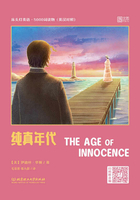
Introduction
Set in New York during the 1870's, The Age ofInnocence depicted life for the aristocracy of Old New York, with the intent upon preserving the traditions of high society. The novel's protagonist, Newland Archer, lived in this exclusive world, and was expected to marry the equally affluent May Welland. However, after being introduced to May's cousin, Ellen Olenska, who had recently relocated to New York after leaving her deceitful European aristocratic husband, Archer began to see flaws in his beloved well-bred fiancée, May, and their confining world of luxury. Archer soon fell in love with the exotic, free-spirited Ellen Olenska, though the two at last decided they must not be together, knowing that wherever they escaped to, society would harshly judge their love.
In part, Edith Wharton based the novel on her own experience in the suffocating environment of New York. After being forced to marry a man thirteen years senior, Wharton became disillusioned in the severe environment of her class, leaving her no opportunity to express herself. The novel was written after the bloody madness of World War Ⅰ, a time of intense social change across the West and in Old New York. American novelist Edith Wharton had already been living in Paris for five years; it was quite a change from the stuffy confines of New York society.
The novel thus not only depicted the author's youth, but also illustrated the faded world of the old aristocracy, which later went through an immense upheaval. While post-Civil War New York aristocracy viewed itself as the upper crust of society, Wharton subtly compared the unyielding social customs to those of primitive civilizations.
innocence /ˈɪnəsəns/ n.天真,纯真
depict/dɪˈpɪkt/vt.描绘,描述
aristocracy/ˌærɪˈs tɒk rəsɪ/n.贵族,贵族政府,贵族统治
protagonist /p rəʊˈt æɡənɪs t/ n. (戏剧、故事、小说中的)主角,领导者,积极参加者
exclusive/ɪkˈsklu:sɪv/adj. 排外的,不愿接收新成员的
affluent/ˈæflʊənt/adj.丰富的,富裕的
deceitful/dɪˈsi:tfʊl/adj.欺诈的
aristocratic/ˌærɪs təˈk rætɪk/a d j.贵族的,贵族化的,贵族政治的
flaw /flɔ:/ n. 缺点,裂纹,瑕疵
breed/bri:d/vt.(使)繁殖,教养,抚养(bred为其过去式和过去分词)
exotic/ɪɡˈzɒtɪk/adj.吸引人的
harshly/hɑ:ʃlɪ/adv.严厉地,苛刻地
suffocating/ˈsʌfəkeɪtɪŋ/adj.令人窒息的,憋气的
disillusioned/ˌdɪsɪˈlu:ʒənd/adj.幻想破灭的
severe/sɪˈvɪə/adj.严厉的,严格的,剧烈的,严重的,严峻的
opportunity/ˌɒpəˈtju:nətɪ/n.机会
stuffy/ˈstʌfɪ/adj.乏味的
illustrate/ˈɪləstreɪt/vt. 举例说明,图解,加插图于,阐明
immense/ɪˈmens/adj. 极广大的,无边的
upheaval/ʌpˈhi:vəl/n.剧变
crust/krʌst/n. 外壳,面包皮(the upper crust:最高阶层)
subtly/ˈsʌtlɪ/adv. 敏锐地,精细地,巧妙地
unyielding/ʌnˈji:ldɪŋ/adj. 坚硬的,不能弯曲的,不屈的
primitive/ˈprɪmɪtɪv/adj. 原始的,远古的,粗糙的,简单的
civilization /ˌsɪvɪlaɪˈz eɪʃən/ n.文明,文化,文明社会